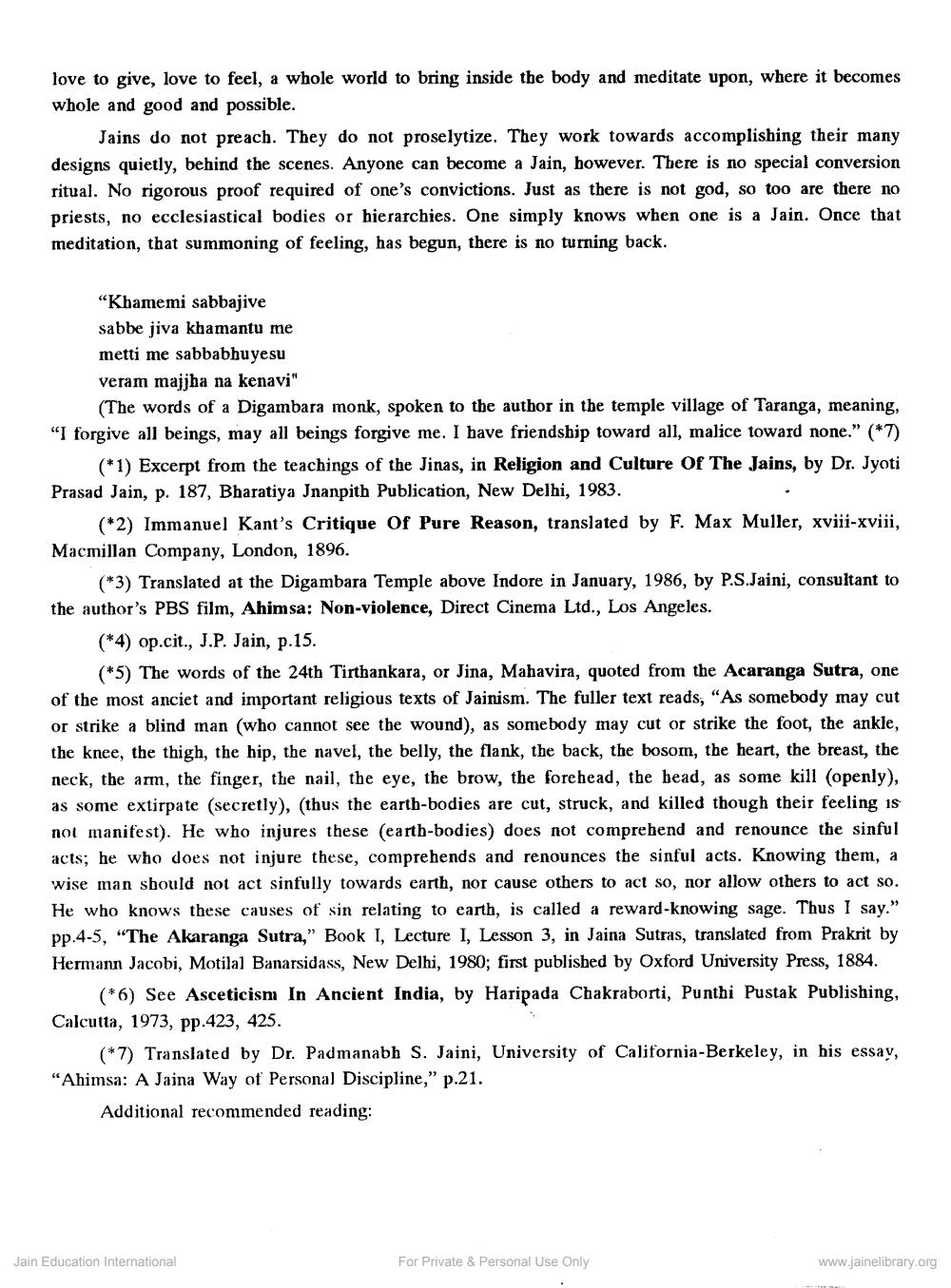________________
love to give, love to feel, a whole world to bring inside the body and meditate upon, where it becomes whole and good and possible.
Jains do not preach. They do not proselytize. They work towards accomplishing their many designs quietly, behind the scenes. Anyone can become a Jain, however. There is no special conversion ritual. No rigorous proof required of one's convictions. Just as there is not god, so too are there no priests, no ecclesiastical bodies or hierarchies. One simply knows when one is a Jain. Once that meditation, that summoning of feeling, has begun, there is no turning back.
"Khamemi sabbajive sabbe jiva khamantu me metti me sabbabhuyesu veram majjha na kenavi"
(The words of a Digambara monk, spoken to the author in the temple village of Taranga, meaning, "I forgive all beings, may all beings forgive me. I have friendship toward all, malice toward none." (*7)
(*1) Excerpt from the teachings of the Jinas, in Religion and Culture Of The Jains, by Dr. Jyoti Prasad Jain, p. 187, Bharatiya Jnanpith Publication, New Delhi, 1983.
(*2) Immanuel Kant's Critique of Pure Reason, translated by F. Max Muller, xviii-xviii, Macmillan Company, London, 1896.
(*3) Translated at the Digambara Temple above Indore in January, 1986, by P.S.Jaini, consultant to the author's PBS film, Ahimsa: Non-violence, Direct Cinema Ltd., Los Angeles.
(*4) op.cit., J.P. Jain, p.15.
(*5) The words of the 24th Tirthankara, or Jina, Mahavira, quoted from the Acaranga Sutra, one of the most anciet and important religious texts of Jainism. The fuller text reads, "As somebody may cut or strike a blind man (who cannot see the wound), as somebody may cut or strike the foot, the ankle, the knee, the thigh, the hip, the navel, the belly, the flank, the back, the bosom, the heart, the breast, the neck, the arm, the finger, the nail, the eye, the brow, the forehead, the head, as some kill (openly), as some extirpate (secretly), (thus the earth-bodies are cut, struck, and killed though their feeling is not manifest). He who injures these (earth-bodies) does not comprehend and renounce the sinful acts; he who does not injure these, comprehends and renounces the sinful acts. Knowing them, a wise man should not act sinfully towards earth, nor cause others to act so, nor allow others to act so. He who knows these causes of sin relating to earth, is called a reward-knowing sage. Thus I say." pp.4-5, "The Akaranga Sutra," Book I, Lecture I, Lesson 3, in Jaina Sutras, translated from Prakrit by Hermann Jacobi, Motilal Banarsidass, New Delhi, 1980; first published by Oxford University Press, 1884.
(*6) See Asceticism In Ancient India, by Haripada Chakraborti, Punthi Pustak Publishing, Calcutta, 1973, pp.423, 425.
(* 7) Translated by Dr. Padmanabh S. Jaini, University of California-Berkeley, in his essay, "Ahimsa: A Jaina Way of Personal Discipline," p.21.
Additional recommended reading:
Jain Education International
For Private & Personal Use Only
www.jainelibrary.org




